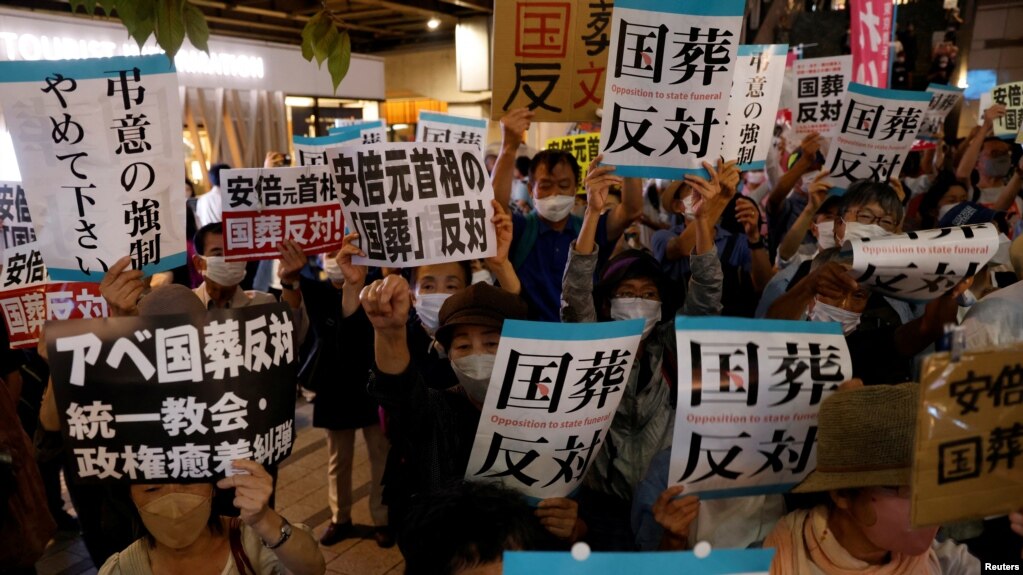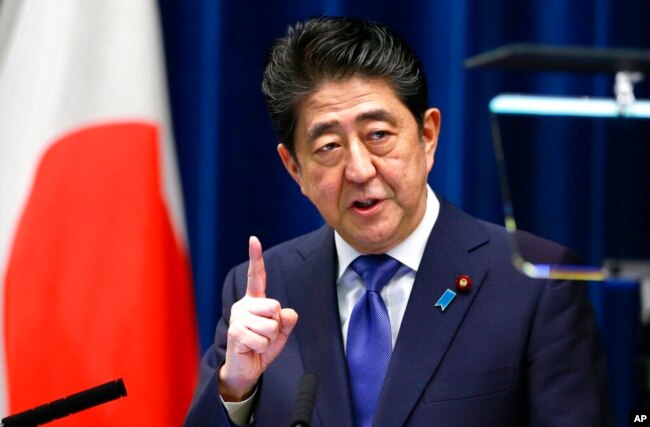September 25, 2022
William Gallo

Protesters attend a rally against Japan's state funeral
for former Prime Minister Shinzo Abe that will be held
next Tuesday in Tokyo, Japan, Sept. 25, 2022.
TOKYO —
Hundreds of foreign dignitaries are expected to attend Tuesday’s state funeral for former Japanese Prime Minister Shinzo Abe, a reflection of his broad popularity overseas. But Abe, who was assassinated in July, leaves a more divided legacy at home.
Abe, Japan’s longest-serving prime minister, won respect, especially among right-leaning nationalists, for making his country stronger amid increasing threats from China and North Korea. He also brought relative stability, ending a six-year period during which Japan averaged a new prime minister every year.

TOKYO —
Hundreds of foreign dignitaries are expected to attend Tuesday’s state funeral for former Japanese Prime Minister Shinzo Abe, a reflection of his broad popularity overseas. But Abe, who was assassinated in July, leaves a more divided legacy at home.
Abe, Japan’s longest-serving prime minister, won respect, especially among right-leaning nationalists, for making his country stronger amid increasing threats from China and North Korea. He also brought relative stability, ending a six-year period during which Japan averaged a new prime minister every year.

Shinzo Abe speaks during a press conference at the
prime minister's official residence in Tokyo, on Sept. 25, 2017.
Abe’s conservative policies also angered many Japanese, though, who say he brought the country closer to war – something unimaginable for a country with a technically pacifist defense architecture. While his signature “Abenomics” strategy was ambitious, it ultimately failed to spark higher growth.
Abe’s mixed legacy helps explain the public backlash against his state funeral. Polls show a large majority of Japanese oppose the idea of holding a state funeral, which is usually reserved for the emperor and his family. Many say the event will be too expensive. The government projects the funeral will cost $12 million, much higher than an earlier estimate.
“It doesn’t matter whether he served a long time or not,” said Mario Ito, a Tokyo resident walking outside the central Shibuya train station on Sunday.
“Seventy percent of Japanese people are opposed to doing this – the fact they’re going ahead with it shows the government isn’t working properly,” he said.
“I really admire his legacy,” said Ms. Sasaki, another Tokyo resident. “But I don’t think there’s a need to spend this much money to hold a huge state funeral,” said a woman who would only provide her last name.
Though Abe’s rule was long-lasting, his popularity had declined by the time he left office, said Jeffrey J. Hall, a Japanese politics specialist at the Kanda University of International Studies.
“As a prime minister he was successful in winning elections with his party again and again. But those elections had quite a low turnout. So even though he was winning, elections didn't mean that he was a very, very popular politician or loved by the people,” Hall said.
Part of the current backlash to Abe has to do with the ruling party’s ties to the controversial, South Korea-based Unification Church. Abe’s suspected killer said the group took excessive donations from his mother, leaving her impoverished. He accused Abe of supporting the church.
Abe’s party, the ruling Liberal Democratic Party of Japan, earlier this month revealed that at least 179 of its lawmakers had connections to the Unification Church, which some of its former members see as a cult.
“You can't really separate this funeral and Abe's legacy from the Unification Church scandal, because as the party is revealed to have more and more ties to this church, most of these people were close associates of Abe, many of them within his own faction of the party,” said Hall.
It has created a tricky situation for Japanese Prime Minister Fumio Kishida, an Abe protege. His approval rating has sunk to new lows. However, the fallout may be limited, since the party doesn’t face any major national elections until 2025.
Abe’s state funeral will be held Tuesday at Tokyo’s Nippon Budokan Hall. Over 190 foreign delegations are expected to attend. It will serve as an occasion for world leaders to say goodbye to one of the 21st century's most influential leaders.
The U.S. delegation will be led by U.S. Vice President Kamala Harris. Asked about Japanese criticism of Abe’s funeral, a senior U.S. official said he is “not going to comment on any internal Japanese attitudes.”
“All I can say from our point of view is that Prime Minister Abe was a great friend of the United States,” the U.S. official said. “He was a great leader for Japan.”
Abe’s conservative policies also angered many Japanese, though, who say he brought the country closer to war – something unimaginable for a country with a technically pacifist defense architecture. While his signature “Abenomics” strategy was ambitious, it ultimately failed to spark higher growth.
Abe’s mixed legacy helps explain the public backlash against his state funeral. Polls show a large majority of Japanese oppose the idea of holding a state funeral, which is usually reserved for the emperor and his family. Many say the event will be too expensive. The government projects the funeral will cost $12 million, much higher than an earlier estimate.
“It doesn’t matter whether he served a long time or not,” said Mario Ito, a Tokyo resident walking outside the central Shibuya train station on Sunday.
“Seventy percent of Japanese people are opposed to doing this – the fact they’re going ahead with it shows the government isn’t working properly,” he said.
“I really admire his legacy,” said Ms. Sasaki, another Tokyo resident. “But I don’t think there’s a need to spend this much money to hold a huge state funeral,” said a woman who would only provide her last name.
Though Abe’s rule was long-lasting, his popularity had declined by the time he left office, said Jeffrey J. Hall, a Japanese politics specialist at the Kanda University of International Studies.
“As a prime minister he was successful in winning elections with his party again and again. But those elections had quite a low turnout. So even though he was winning, elections didn't mean that he was a very, very popular politician or loved by the people,” Hall said.
Part of the current backlash to Abe has to do with the ruling party’s ties to the controversial, South Korea-based Unification Church. Abe’s suspected killer said the group took excessive donations from his mother, leaving her impoverished. He accused Abe of supporting the church.
Abe’s party, the ruling Liberal Democratic Party of Japan, earlier this month revealed that at least 179 of its lawmakers had connections to the Unification Church, which some of its former members see as a cult.
“You can't really separate this funeral and Abe's legacy from the Unification Church scandal, because as the party is revealed to have more and more ties to this church, most of these people were close associates of Abe, many of them within his own faction of the party,” said Hall.
It has created a tricky situation for Japanese Prime Minister Fumio Kishida, an Abe protege. His approval rating has sunk to new lows. However, the fallout may be limited, since the party doesn’t face any major national elections until 2025.
Abe’s state funeral will be held Tuesday at Tokyo’s Nippon Budokan Hall. Over 190 foreign delegations are expected to attend. It will serve as an occasion for world leaders to say goodbye to one of the 21st century's most influential leaders.
The U.S. delegation will be led by U.S. Vice President Kamala Harris. Asked about Japanese criticism of Abe’s funeral, a senior U.S. official said he is “not going to comment on any internal Japanese attitudes.”
“All I can say from our point of view is that Prime Minister Abe was a great friend of the United States,” the U.S. official said. “He was a great leader for Japan.”
No comments:
Post a Comment